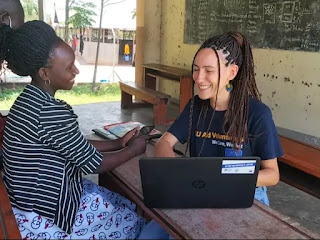As I'm drafting this post from the back of the car taking us to a school in Lodonga, West Nile, I am reminded that the Boda stage we just passed is where you can pick a motorbike to take you to South Sudan or Democratic Republic of the Congo. In fact the border to DRC is only about 10 km away, and Mont Kei is the only natural barrier to South Sudan, a few more miles ahead.
From a Mosque, some small children wearing their Hijabs and Kufis say hi, smiling with curiosity to the strangers hiding inside the vehicle. Few minutes on the bumpy road ahead, and a big Cathedral built in Roman style opens the way to the school.
As my Google Maps timeline reminds me of the 2550 km completed in 105 hours worth of travel this month, with a mix of cars, busses, motorbikes, ferries and my own feet, I realise that I am still yet to see so much of this wonderful country. Maybe this was the reason I decided to extend my contract with EUAV, or maybe it was my gut speaking for me, whispering that I am not ready to return to Europe yet. After the initial difficult months I lived, I feel I've just recently started enjoying my life here to the fullest, seeing the famous cultural adjustment curve spiking.
As a typical Italian would do, I organised most of my holiday in August. Whether for leisure, visiting the animals of Murchison Falls national park, and sharing the garden with a hippo ruminating next to an our tent, or for personal enrichment, organising a visit to Amuno , a grassroot organisation supporting children by offering a local library, funded and managed by a good friend of mine near Mbale, in the East of the country. The common denomination of these trips was scenery-filled hikes, powerful waterfalls, nights full of stars, children's curious smiles and bus' subculture.
Workwise I must say this has been one of the most exciting months, too. From the final training in Gulu, where our learners from Uganda Pioneers Association (UPA) Graduated in The Mondo Digital Competencies Training, to mentoring the newly graduated Trainers from UPA in Kampala with their first training sessions to new community members, to the insightful and moving interviews I conducted with the young refugees of Windle international in collecting their testimonies to, finally, the visit to the Rhino Refugee Settlement in West Nile to collect data and talk to the beneficiaries.
A glimpse into life in the Refugee Settlement:
Despite Uganda having one of the best refugee reception systems of the continent, life in the camp is harsh.
One of the learners interviewed at Ocea vocational skills training centre in Rhino Camp, explained that refugees are given 30sq meters of land to build a house, but nowhere to grow crops. Finding a job, also, is extremely hard due to language barriers, episodes of discrimination (both from host community and of tribalism nature), and a general lack of employment opportunities, especially amongst the youth, that characterizes the region.
The long journey to Rhino Camp Refugee Settlement was a worthy opportunity to gather qualitative data, successful stories from the learners, as well as observe the committed ICT instructor of the centre carrying out the Digital Competencies Training.
Mondo Digital Competencies Training (DCT) is part of the offer at the Vocational skills training centre managed by our partners Norwegian Refugee Council. The trades (or courses) offered there, such as hairdressing, tailoring, solar panels installation, mechanics, and ICT are accessible to both Refugees and host community members, respectively to 70% and 30%, in line with governmental policy, to increase employability skills for those whose opportunities are limited not only due to their status and language barriers but also to a low employment rates amongst the youth.
What did the DCT bring to these youth?
Learning to use digital tools, many reported, was a way to become more emancipated and fulfill educational goals that would be otherwise inaccessible. Some are starting a business, and learning, for example, to market their products helps them reach potential customers, as Martin, a young refugee from South Sudan who spent most of his life in the settlement and who sells crafted sandals, shared with me. Some are becoming able to explore their creativity with video editing which enhances their digital visibility and boosts their hopes for the future, like Winny, an 18 years old Ugandan young woman revealed.
Despite the bumpy roads (in all senses) of living in rural and remote areas, we grasped a sense of hope and captured their powerful and resilient smiles which are a fuel to our organisation to continue the work and the valuable partnership in one of the largest refugee settlements in Uganda.
I'm making my way back to Kampala as I'm finalising this blog posts on my phone. From the window of the car, I steal with my eyes the now familiar images of women walking in line, wearing their beautiful kitenge dresses whilst carrying basket on their heads or babies wrapped on their back; the children carrying other children; men, women and children digging the field, the goats jumping on the rocks on the side of the road; the clothes drying in the sun, on the grass roof's huts concealed in a deep vegetation. I'm feeding my eyes with these images and I'm learning that they are hungry for more.










No comments :
Post a Comment